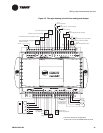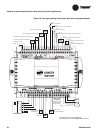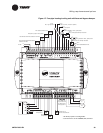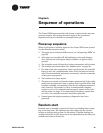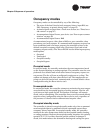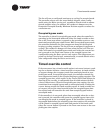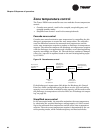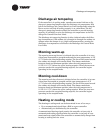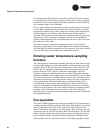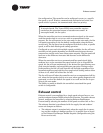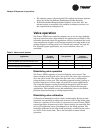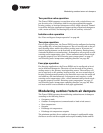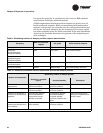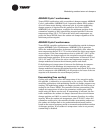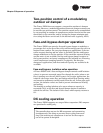
Discharge air tempering
CNT-SVX07C-EN 39
Discharge air tempering
If the controller is in cooling mode, cascade zone control initiates a dis-
charge air tempering function when the discharge air temperature falls
below the Discharge Air Control Point Low Limit (configurable using the
Rover service tool) and all cooling capacity is at a minimum. The dis-
charge air tempering function allows the controller to provide heating
capacity (if available) to raise the discharge air temperature to the Dis-
charge Air Control Point Low Limit.
The discharge air tempering function is often initiated under the follow-
ing circumstances: Cold outdoor air is brought in through the outdoor air
damper when the damper is at (a high) minimum position, causing the
discharge air temperature to fall below the Discharge Air Control Point
Low Limit.
Morning warm-up
The morning warm-up feature is initiated when the controller is in tran-
sition from unoccupied to occupied mode and the zone temperature is 3°F
(1.7°C) below the occupied heating setpoint. The fan will be turned on and
the outdoor air damper will remain closed. The damper modulates
between closed and minimum position when the zone temperature is
2–3°F (1.2–1.7°C) below the active heating setpoint. When the zone tem-
perature reaches the occupied heating setpoint, the controller begins
operating in the occupied mode.
Morning cool-down
The morning cool-down feature is initiated when the controller is in tran-
sition from unoccupied to occupied and the zone temperature is 3°F
(1.7°C) above the occupied heating setpoint. The fan will be turned on and
the outdoor air damper will remain closed. The damper modulates
between closed and minimum position when the zone temperature is
2–3°F (1.2–1.7°C) above the active cooling setpoint. When the zone tem-
perature reaches the occupied heating setpoint, the controller begins
operating in the occupied mode.
Heating or cooling mode
The heating or cooling mode can be determined in one of two ways:
• By a communicated signal from a BAS or a peer controller
• Automatically, as determined by the controller
A communicated heating signal permits the controller to heat only. A
communicated cooling signal permits the controller to cool only. A com-
municated auto signal allows the controller to automatically change from
heating to cooling and vice versa.



